Pediatric Residency Program Spotlight: Empowering the Next Generation of Pediatricians
At CommUnityCare Health Centers, we pride ourselves on not only providing exceptional care to our community but also fostering the growth and development of the next generation of healthcare professionals.
The CommUnityCare Pflugerville Health Center is proudly helping train the next generation of pediatric leaders through its pediatric residency program affiliated with Dell Medical School at The University of Texas at Austin.
How a Resident is Involved in Your Care
Residency programs serve to educate doctors in training while caring for current patients. Residents are scheduled in clinic regularly and far in advance to maintain stable teams and provide patient continuity. This approach not only ensures that patients receive consistent and familiar care, but it also introduces a new level of attention and thoroughness to their medical treatment.
“Residents bring fresh perspectives and the latest medical knowledge from their rigorous training. Their commitment to learning and improvement often results in excellent patient evaluations and innovative treatment plans,” said Dr. Tara Greendyk, CommUnityCare Director of Child and Adolescent Health and Dell Medical School Assistant Professor.
“Also, the collaborative environment, with supervising physicians overseeing and mentoring residents, guarantees that patients benefit from a combination of experienced oversight and the energetic, up-to-date approach of resident doctors. This dynamic not only enhances the quality of care but also fosters a learning culture where every interaction aims to improve patient outcomes and healthcare practices.”
Residents are physicians who have completed medical or osteopathic school. After earning their M.D. or D.O. degree, they pursue 2 to 7 years of advanced training in a specialty like pediatrics. Key to Dell Med’s graduate medical education curriculum, the residents that train within CommUnityCare Health Centers are equipped to tackle systemic challenges in health and lead change in an evolving health care landscape.
A Focus on Community Health
Community health is a central tenet of the pediatric residency program at CommUnityCare Health Centers. Residents learn to understand and address the social determinants of health that impact our patients.
Our health center’s commitment to serving underserved populations ensures that residents gain valuable experience in providing care to diverse and vulnerable patient groups. This experience not only enriches their training but also instills a deep sense of social responsibility and compassion.
Through the pediatric residency program, skilled and compassionate pediatricians go on to make significant contributions to the field. Their success is a testament to the quality of training they received and their dedication to improving the health and well-being of children.
Success Story: Yesenia Delgado, M.D.
Dr. Yesenia Delgado’s journey to becoming a pediatrician at CommUnityCare Health Centers is a testament to her resilience and passion for serving underserved populations. Growing up as a first-generation Mexican American, Delgado experienced firsthand the challenges faced by many of the families who receive care at CommUnityCare Health Centers. This personal history instilled in her a deep empathy and commitment to making a difference in the lives of children from similar backgrounds, something her family fostered from a young age.
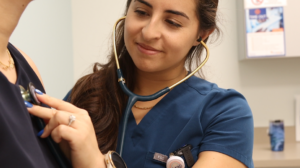
“My family did a really good job of fostering the dream of becoming a pediatrician. They never giggled or thought it was funny. They encouraged me, even buying fake stethoscopes,” said Dr. Delgado. “My dad did have had one rule though, no matter what you do in life you need to help people.”
During her three-year pediatric residency at Dell Medical School at The University of Texas at Austin, Dr. Delgado took advantage of the individualized curriculum to gain exposure in both general pediatrics and subspecialty medicine.
During her rotations at CommUnityCare Health Centers, Delgado fell in love with the centers commitment toward serving underserved populations. Dr. Delgado’s cultural background and personal experiences uniquely positioned her to understand the struggles of the families she served at CommUnityCare. She brought a profound level of empathy to her practice, often going the extra mile to ensure her patients received the care they needed. Whether addressing common pediatric issues or more complex health concerns, she worked to break down barriers to healthcare for her patients.
“As a first-generation Mexican American, I think I resonate with a lot of the things my patients experience. For instance, English being my second language or having a mom who doesn’t speak English,” added Delgado. “I try to reassure my patients and a lot of them find comfort with someone who talks like them or has experienced similar things as them. That is really what draws me here to CommUnityCare Health Centers and I feel very fulfilled after my workday.”
Dr. Delgado’s story is an inspiring example of how personal experiences can fuel a career dedicated to helping others. Dr. Delgado has completed her residency at Dell Med and accepted a position with CommUnityCare Health Centers as a Primary Care Provider at the new Del Valle Health Center opening late 2024. The Del Valle Health Center brings health care to an area historically underserved in Eastern Travis County.
Pflugerville Health Center
We are now accepting new pediatric patients at the CommUnityCare Pflugerville Health Center. To make an appointment, visit communitycaretx.org.
Additional Educational Opportunities
CommUnityCare Health Centers is home to nine medical residency programs affiliated with the Dell Medical School at The University of Texas at Austin, including pediatrics, family medicine and internal medicine. We also partner with a variety of other higher education institutions and school districts, including Austin Community College and the Austin Independent School District, helping to train frontline healthcare workers.
For more information, visit our Educational Opportunities page.
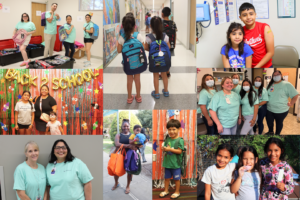 For the first time, CommUnityCare Health Centers was proud to offer Back to School Events at three of its health centers.
For the first time, CommUnityCare Health Centers was proud to offer Back to School Events at three of its health centers. 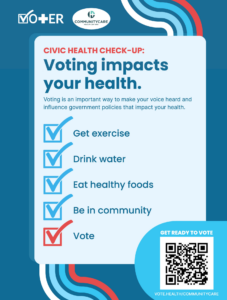 Vot-ER Resources
Vot-ER Resources As of July 25, 2024, all text messages from CommUnityCare Health Centers will be sent through Epic Hello World using the SMS short code, 65934. Patients who have opted to receive text messages will continue to receive all future communication from the new number.
As of July 25, 2024, all text messages from CommUnityCare Health Centers will be sent through Epic Hello World using the SMS short code, 65934. Patients who have opted to receive text messages will continue to receive all future communication from the new number.  Central Health System Overview:
Central Health System Overview:  We are seeking individuals from priority populations with an emphasis on multi-marginalized people, such as those who are unsheltered or unhoused, and persons of color:
We are seeking individuals from priority populations with an emphasis on multi-marginalized people, such as those who are unsheltered or unhoused, and persons of color: 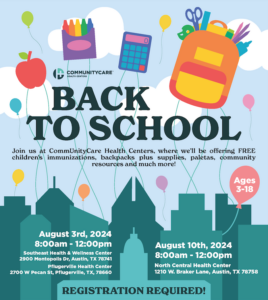 In honor of National Health Center Week, CommUnityCare Health Centers is excited to host three back-to-school events to prepare Central Texas children for the upcoming school year.
In honor of National Health Center Week, CommUnityCare Health Centers is excited to host three back-to-school events to prepare Central Texas children for the upcoming school year.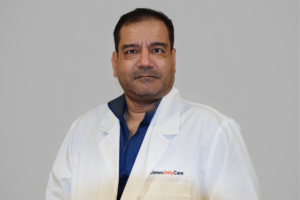
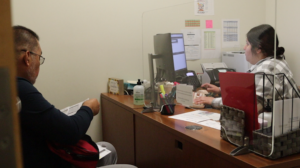 “Patients received a letter in the mail letting them know if they had to go through that recertification process for Medicaid. The problem with that is because we had continuous Medicaid for three-plus years, some folks moved and didn’t get the envelope, others didn’t hear about it, or they didn’t understand why they received the envelope,” said CommUnityCare Chief Operating Officer, Nancy Ban. “So, we had many patients who did not know how to get back on Medicaid.”
“Patients received a letter in the mail letting them know if they had to go through that recertification process for Medicaid. The problem with that is because we had continuous Medicaid for three-plus years, some folks moved and didn’t get the envelope, others didn’t hear about it, or they didn’t understand why they received the envelope,” said CommUnityCare Chief Operating Officer, Nancy Ban. “So, we had many patients who did not know how to get back on Medicaid.”